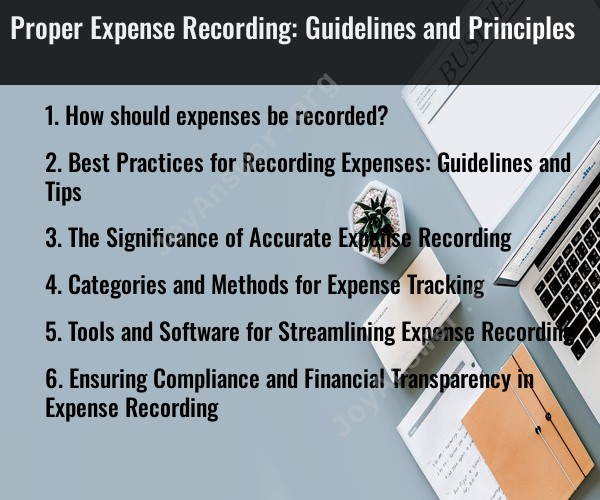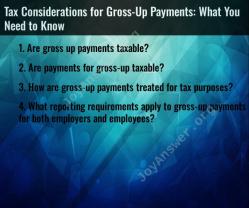How should expenses be recorded?
Proper expense recording is essential for effective financial management, whether it's for personal finances or business. Here are some guidelines and principles on how expenses should be recorded:
Use a System:
- Establish a consistent system for recording expenses. This could be a physical ledger, a spreadsheet, or accounting software, depending on your needs and preferences.
Categorize Expenses:
- Categorize expenses into meaningful categories (e.g., groceries, rent, utilities, office supplies, travel) to make tracking and analysis easier.
Record All Expenses:
- Record every expense, no matter how small. Even minor expenses can add up over time.
Date and Description:
- For each expense, record the date of the transaction and a clear description of what it was for. This helps when reviewing your records and for tax purposes.
Attach Receipts:
- Whenever possible, attach receipts or supporting documentation to your records. This is especially important for business expenses and tax purposes.
Maintain a Logical Order:
- Record expenses in a logical order, such as by date or by category. This makes it easier to review and reconcile records.
Separate Business and Personal Expenses:
- If you're managing both personal and business expenses, keep them separate to avoid confusion. Use separate accounts or designate specific categories for each.
Use Digital Tools:
- Consider using expense tracking apps or accounting software to streamline the process. Many apps allow you to scan and store digital copies of receipts.
Set Budgets:
- Establish and track budgets for various expense categories to ensure you're staying within your financial goals.
Reconcile Regularly:
- Reconcile your expense records with your bank or credit card statements to catch any discrepancies or errors.
Currency Conversion (if applicable):
- If you incur expenses in foreign currencies, make sure you record the exchange rates and currency conversions accurately.
Emergency Fund and Savings:
- Allocate a portion of your income to an emergency fund and savings. Recording these as expenses helps build financial stability.
Tax Considerations:
- Understand what expenses may be tax-deductible and ensure you have accurate records for tax reporting. Seek advice from a tax professional if necessary.
Backup Records:
- Create digital backups of your records to safeguard against loss or damage to physical copies.
Consult a Financial Advisor:
- If your financial situation is complex or you're unsure about certain financial decisions, consult with a financial advisor or accountant for guidance.
Review and Analyze:
- Periodically review your expense records to identify spending patterns, track financial goals, and make necessary adjustments to your budget.
Proper expense recording is crucial for understanding your financial health, making informed financial decisions, and ensuring compliance with tax regulations. Following these guidelines and principles will help you maintain accurate and organized expense records.
Best Practices for Recording Expenses: Guidelines and Tips
Accurate and timely expense recording is essential for personal financial management and business accounting. Here are some best practices:
- Gather and retain receipts and other supporting documentation. This will provide evidence of your expenses and make it easier to justify them for reimbursement or tax purposes.
- Enter your expenses into a spreadsheet or accounting software program. This will help you to track your spending, categorize your expenses, and generate reports.
- Categorize your expenses consistently. This will help you to identify areas where you are overspending and to make adjustments to your budget.
- Review your expenses regularly. This will help you to identify trends and patterns in your spending and to make necessary changes.
The Significance of Accurate Expense Recording
Accurate expense recording is important for a number of reasons:
- It helps you to track your spending and to identify areas where you can save money.
- It makes it easier to create and budget.
- It helps you to prepare your tax return.
- It provides a record of your expenses for reimbursement or audit purposes.
- It demonstrates financial responsibility and transparency.
Categories and Methods for Expense Tracking
There are many different ways to categorize and track your expenses. Some common expense categories include:
- Personal: Housing, food, transportation, utilities, insurance, entertainment, etc.
- Business: Travel, meals, lodging, office supplies, postage and shipping, etc.
- Other: Medical, dental, educational, charitable, etc.
You can track your expenses manually using a spreadsheet or a notebook, or you can use a variety of software programs and apps. Some popular expense tracking tools include:
- Mint
- Personal Capital
- YNAB
- Expensify
- Zoho Expense
Tools and Software for Streamlining Expense Recording
There are a number of tools and software programs that can help you to streamline your expense recording process. These tools can help you to:
- Automatically import transactions from your bank accounts and credit cards.
- Categorize your expenses with the help of artificial intelligence.
- Generate reports on your spending habits.
- Submit expense reports for reimbursement.
Ensuring Compliance and Financial Transparency in Expense Recording
If you are recording expenses for business purposes, it is important to ensure that you are complying with all applicable laws and regulations. This may include maintaining certain records for a specific period of time.
It is also important to be transparent with your expense recording. This means providing accurate and complete information about your expenses, as well as the supporting documentation.
By following these best practices, you can ensure that your expense recording is accurate, efficient, and compliant.











